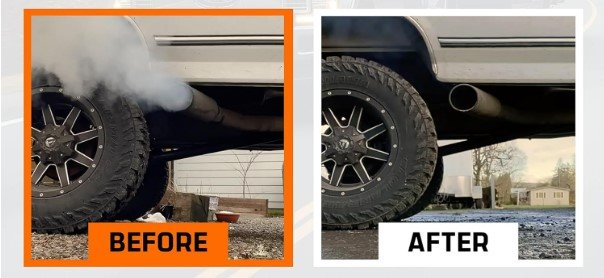5 Best Additive for Engine Oil | Top 5 Engine Oil Additives

If your car’s engine is the heart of your vehicle, then engine oil is its lifeblood. But sometimes, that lifeblood needs a little boost — and that’s where the best additive for engine oil comes in. Think of these additives as performance enhancers that help your engine run smoother, cleaner, and longer. They protect against wear, reduce friction, improve fuel economy, and can even reverse the effects of aging in older engines.
Whether you drive a modern sedan, a heavy-duty truck, or a weekend classic, the right engine oil additive can make a noticeable difference. From quieter performance to fewer cold-start problems, these additives go beyond basic lubrication — they’re science in a bottle.
In this article, we’ll explore the Top 5 Engine Oil Additives that truly stand out in 2025. We’ll dive deep into each product, what makes it special, and how it can benefit your engine. So, if you’ve ever wondered which additive deserves a place in your garage, read on — you might just find your car’s new best friend.
1. Rislone Oil Additive – Advanced Synthetic Protection for Every Vehicle

The Rislone Oil Additive is one of the most trusted names when it comes to improving engine performance and longevity. What makes Rislone stand out is its fully-formulated GF-5 synthetic carrier oil, which is compatible with almost all modern and older engines. Whether you’re driving a small hatchback or a heavy-duty pickup, Rislone’s formulation adjusts beautifully with any oil viscosity — from 0W-20 to 15W-40.
This additive isn’t just about smooth running; it’s about total engine care. It’s packed with nanotungsten and molybdenum friction modifiers, which form a microscopic protective layer inside your engine. That means less friction, reduced wear, and ultimately, more miles between oil changes.
Here’s what makes it shine:
- Improves fuel efficiency by reducing friction between engine parts
- Decreases harmful emissions, contributing to cleaner air
- Works with all oil grades — conventional, synthetic, or blends
- Packed with detergents and dispersants that keep sludge at bay
Rislone is also known for enhancing performance in older engines. If your car has seen a few thousand miles and you’ve noticed minor drops in power or increased oil consumption, Rislone can bring back that lost vitality. It’s like giving your engine a spa day — it comes out cleaner, smoother, and ready for more miles.
In short, this product perfectly balances protection and performance, making it one of the best additives for engine oil you can buy today.
2. XADO Engine Oil Additive – Nano-Tech Revitalization in Every Drop

If you’re looking for an additive that does more than just lubricate, XADO Engine Oil Additive is an absolute game-changer. It’s not just an additive — it’s a restoration formula. XADO uses an innovative 3-component technology with Revitalizant, designed to rebuild worn-out metal surfaces in your engine. That means it doesn’t just protect your engine; it actually helps repair it.
This additive shines when it comes to restoring compression, reducing oil burning, and improving fuel efficiency. Drivers who use XADO often report a noticeable difference in how their engine sounds and feels — smoother acceleration, less noise, and improved power output.
Key benefits include:
- Restores worn metal surfaces through nano-particle bonding
- Increases compression and power output
- Reduces oil consumption and exhaust smoke
- Improves fuel economy for long-term savings
- Lasts up to 60,000 miles per treatment
One of the coolest things about XADO is its eco-friendly formula. It actively reduces CO2, CO, and hydrocarbon emissions, making it not only good for your engine but also for the planet. Plus, it’s incredibly easy to use — one 225ml bottle is enough for a complete oil system treatment for engines up to 5 quarts.
For anyone driving an older vehicle or noticing engine performance issues, XADO can literally reverse the clock. It’s like having a mechanic in a bottle, quietly restoring your engine while you drive.
3. Lucas Oil Additive – Legendary Protection for High-Performance Engines

When it comes to racing-grade additives, few names carry as much weight as Lucas Oil. Their Lucas Oil Additive is specifically engineered for high-performance applications and engines that demand extra protection under extreme pressure. It’s a favorite among racing enthusiasts and classic car owners who want maximum protection for flat tappet camshafts or engines that run hot and hard.
What sets Lucas apart is its exclusive blend of high-pressure additives. This formulation ensures that metal surfaces stay protected even when engines are pushed to the limit — such as during racing or towing. It’s dyno-tested for faster break-in, reduced blow-by, and better valve train protection.
Why it’s a winner:
- Perfect for new engine break-in periods
- Reduces camshaft and lifter wear
- Excellent for racing or heavy-duty conditions
- Compatible with both conventional and synthetic oils
- Provides extreme pressure protection and reduces engine noise
If you’re a performance-oriented driver, or someone who wants their engine to last through intense driving conditions, Lucas Oil Additive is a must-have. It helps seat new piston rings perfectly and prevents premature wear — something every engine builder can appreciate.
The best part? It’s completely universal, so you can use it in almost any vehicle type without worry. Lucas has built a reputation for reliability, and this additive keeps that promise with every bottle.
4. TriboTEX Oil Additive – Nano-Science for Next-Level Engine Performance

The TriboTEX Oil Additive is not your average oil treatment. Developed with funding from NASA and the U.S. Department of Energy, it uses advanced synthetic nanoparticles to reverse wear inside your engine. These particles build a diamond-like carbon coating on metal surfaces, reducing friction and restoring worn components.
What’s amazing about TriboTEX is that it’s self-adaptive — the nanoparticles know exactly where to go and how to repair the engine. This makes it ideal for both old and new engines, whether gasoline or diesel. It also reduces noise, improves acceleration, and helps engines run cooler under load.
Main highlights:
- Rebuilds worn engine surfaces with nanotechnology
- Improves fuel efficiency and reduces engine noise
- Compatible with all oils and vehicle types
- Made in the USA with cutting-edge scientific research
- Backed by a 100% satisfaction guarantee
Drivers often report that their engine runs quieter and feels “refreshed” after a few hundred miles of using TriboTEX. It’s like giving your engine a new lease on life — smoother performance, reduced vibration, and cleaner operation overall.
Here’s a quick comparison table summarizing the first four products:
| Additive | Key Feature | Suitable For | Longevity | Unique Advantage |
|---|---|---|---|---|
| Rislone | Synthetic oil carrier | All vehicles | Regular use | Improves mileage & emission control |
| XADO | Revitalizant nano formula | Cars | 60,000 miles | Repairs worn metal surfaces |
| Lucas Oil | Racing-grade additive | High-performance cars | Regular use | Protects camshafts under extreme pressure |
| TriboTEX | Nano-coating tech | Gas & diesel engines | Long-term | NASA-developed nano protection |
TriboTEX proves that modern science can make even the oldest engines feel new again. It’s one of the most innovative and effective options for those who truly care about the long-term health of their engine.
5. Archoil Oil Additive – The Power Stroke Specialist

If you own a diesel engine, particularly a Ford Power Stroke, then you’ve probably heard about Archoil Oil Additive. This product has built a reputation for solving one of the most common problems among Power Stroke engines — cold start injector issues. The AR9100 Friction Modifier in this additive is specially designed to fix those problems and extend engine life significantly.
What makes Archoil stand out is its multi-purpose design. It’s not limited to engines — you can use it in gearboxes, power steering systems, and differentials too. It helps reduce engine noise, vibrations, and overall operating temperature, which translates to smoother and quieter drives.
Archoil’s key advantages include:
- Fixes cold start issues in 6.0L & 7.3L Power Stroke engines
- Reduces wear, friction, and engine heat
- Extends component life and boosts reliability
- Compatible with gasoline and diesel engines
- Excellent for gearboxes and hydraulic systems
What really wins users over is its versatility. One small 16-ounce jug can treat multiple systems in your vehicle, saving you both time and money. For diesel owners, Archoil isn’t just an additive — it’s a must-have maintenance product that can prevent costly repairs down the road.
It’s safe to say that Archoil earns its place among the top 5 engine oil additives for its unique ability to tackle real-world engine issues while enhancing performance across the board.
How Engine Oil Additives Work – The Science Behind the Magic
Ever wonder what really happens when you pour an engine oil additive into your car? It might look like a simple liquid, but inside that bottle is a blend of powerful chemicals and nano-particles working in harmony to protect your engine. The science behind the best additive for engine oil is fascinating — and surprisingly smart.
When the additive mixes with your engine oil, it instantly begins to modify the oil’s properties. Some ingredients reduce friction, others clean internal components, while a few rebuild worn surfaces at a molecular level. For example, molybdenum and tungsten compounds form a protective film between metal surfaces, minimizing wear during high-speed motion. Additives with detergents and dispersants break down carbon deposits and sludge, ensuring that your engine stays clean inside.
Meanwhile, nano-formulations like TriboTEX or XADO’s Revitalizant technology actually rebuild worn-out metal surfaces. They create a thin, diamond-like carbon coating that fills microscopic scratches, restoring the original smoothness of your engine components. The result? Less noise, better compression, smoother operation, and improved fuel economy.
Simply put, engine oil additives act like multitasking guardians — cleaning, lubricating, protecting, and restoring your engine from the inside out.
Benefits of Using the Best Additive for Engine Oil
Choosing the best additive for engine oil isn’t just about extending oil life — it’s about transforming the way your engine performs every day. When used regularly, the right additive can deliver a wide range of benefits that both new and older vehicles can enjoy.
Let’s explore some of the biggest advantages:
- Reduced friction: Helps minimize metal-to-metal contact, reducing wear and extending engine life.
- Improved fuel efficiency: Less resistance inside the engine means better combustion and fewer wasted drops of fuel.
- Cleaner internals: Detergent agents clean away sludge, varnish, and carbon buildup, keeping your engine spotless.
- Restored performance: Revitalizing additives rebuild worn engine parts, restoring lost compression and power.
- Quieter operation: Reduces noise and vibrations for a smoother, more refined drive.
- Cold start protection: Prevents dry-start wear when your car sits overnight.
- Extended oil life: Enhances the oil’s ability to resist oxidation and thermal breakdown.
When you think about it, spending a few dollars on a premium oil additive can save you hundreds (if not thousands) on engine repairs and rebuilds in the long run. It’s one of those rare automotive investments that pays for itself over time.
How to Choose the Right Engine Oil Additive
Not all engines — or drivers — are the same. That’s why finding the top engine oil additive for your needs depends on a few key factors. Here’s a quick guide to help you make the right choice:
1. Understand Your Engine Type
Is your engine gasoline or diesel? High-performance or daily commuter? Diesel engines generally need additives that can handle higher temperatures and soot levels (like Archoil), while gasoline engines benefit from additives that focus on reducing friction and restoring metal surfaces (XADO or Rislone).
2. Check Compatibility with Your Oil
Always verify that the additive you’re choosing is compatible with your oil type and viscosity. Some additives, like Rislone, work with all grades — from 0W-20 to 15W-40 — making them a safe choice for any vehicle.
3. Identify Your Goal
What’s your main reason for using an additive?
- For wear protection, go with Lucas Oil Additive.
- For engine restoration, choose XADO or TriboTEX.
- For diesel cold starts, Archoil is unbeatable.
- For overall engine cleanliness and mileage, Rislone is a proven performer.
4. Longevity and Value
Some additives last only until your next oil change, while others, like XADO, offer protection for up to 60,000 miles. Always consider long-term value when deciding.
5. Ease of Use
You shouldn’t need a mechanic to apply an additive. Look for options that simply pour into your oil filler — no tools required.
By evaluating your vehicle’s condition, driving style, and maintenance goals, you can confidently select the best additive for engine oil that fits your needs.
Expert Tips for Using Engine Oil Additives
To get the most out of your oil additive, a few smart habits can make a world of difference. These tips will ensure your engine reaps all the benefits these products promise.
- Add during an oil change: The best time to pour your additive is right after an oil change when the oil is fresh and clean.
- Follow the dosage instructions: Using too much won’t boost performance — it can actually disrupt oil balance. Always stick to the manufacturer’s recommendation.
- Warm up the engine: Let your car idle for a few minutes after adding the product to ensure proper mixing and circulation.
- Stay consistent: Regular use over time provides compounding benefits, especially for wear protection and cleaning.
- Listen to your engine: After a few hundred miles, you’ll often notice reduced noise or smoother acceleration. That’s your additive doing its job.
- Store properly: Keep the additive sealed and away from extreme heat or cold to maintain its chemical integrity.
Following these steps will help maximize the impact of whichever engine oil additive you choose — keeping your engine running strong and reliable for years to come.
Comparing the Top 5 Additives – Quick Summary Table
Here’s a quick recap comparing the Top 5 Engine Oil Additives discussed in this article:
| Brand | Key Technology | Best For | Benefits | Longevity |
|---|---|---|---|---|
| Rislone | Synthetic GF-5 carrier with anti-wear agents | All vehicles | Improves mileage, reduces emissions, cleans engine | Regular use |
| XADO | Revitalizant 3-component nano formula | Cars, aging engines | Rebuilds metal, improves compression | 60,000 miles |
| Lucas Oil | Extreme pressure blend | Performance & racing engines | Prevents camshaft wear, improves break-in | Regular use |
| TriboTEX | Nano-engineered diamond-like coating | Gasoline & diesel engines | Restores surfaces, reduces noise | Long-lasting |
| Archoil | AR9100 Friction Modifier | Diesel & gasoline engines | Fixes cold starts, reduces vibration & wear | Multi-system use |
Each product has its own strengths. If you’re unsure, start with Rislone for all-around performance or TriboTEX if you’re looking for advanced nanotech protection. Diesel owners will benefit the most from Archoil, while performance drivers should look toward Lucas Oil Additive.
Real-World Experiences: What Drivers Are Saying
Car enthusiasts and everyday drivers alike have shared glowing reviews about these engine oil additives. Many users noticed significant changes after just a few hundred miles. Here’s a glimpse of real-world experiences:
- “My 2014 Ford F-250 had terrible cold-start issues in winter. After using Archoil, it starts like a dream every morning.”
- “I used XADO in my old Honda Civic, and within 1,000 miles, the engine sounded quieter and stopped burning oil.”
- “Rislone gave me an extra 2 MPG and a smoother idle — it’s worth every penny.”
- “After adding TriboTEX, my car feels like it just got a new engine. The improvement is unreal.”
These testimonials show that additives aren’t just marketing hype — they deliver tangible, real-world benefits. From professional mechanics to DIY drivers, the consensus is clear: using the best additive for engine oil is a smart move for anyone who values performance and protection.
Common Mistakes to Avoid When Using Additives
While additives can do wonders, using them incorrectly can reduce their effectiveness. Here are a few common mistakes to avoid:
- Mixing multiple additives: Don’t use two or more brands at the same time — their chemical formulas can clash.
- Ignoring oil type: Always make sure your additive matches your oil’s viscosity and composition.
- Using old or expired products: Like any chemical, additives lose potency over time.
- Overdosing: More isn’t better; excessive additive can alter your oil’s lubrication balance.
- Skipping regular oil changes: Even with additives, old oil can’t perform miracles. Always follow your oil change schedule.
By avoiding these pitfalls, you’ll ensure your engine gets only the benefits — not the drawbacks.
FAQs – Everything You Need to Know About Engine Oil Additives
1. Are engine oil additives safe for all vehicles?
Yes, most modern additives are formulated to be safe for all vehicle types, including gasoline, diesel, and hybrid engines. However, always check the label for compatibility before use.
2. Can I use an additive with synthetic oil?
Absolutely! In fact, many of the best engine oil additives like Rislone and TriboTEX are designed specifically for use with synthetic oils.
3. How often should I use an engine oil additive?
It depends on the product. Some, like XADO, last for up to 60,000 miles, while others are meant to be added at each oil change. Always follow the manufacturer’s directions.
4. Do additives really improve fuel economy?
Yes. By reducing internal friction and improving combustion efficiency, additives can help boost fuel economy — sometimes by as much as 5–10%.
5. Can additives fix oil leaks?
While they can reduce minor leaks caused by wear or seal shrinkage, they’re not a permanent solution for large oil leaks. Always consult a mechanic for serious issues.
6. Are engine oil additives worth the money?
Definitely. The cost of a bottle of additive is small compared to the price of replacing or repairing an engine. They’re an affordable way to add protection and longevity.
7. Can additives make my car run quieter?
Yes! Many drivers notice less engine noise and vibration after using friction-reducing additives like Lucas Oil or TriboTEX.
8. Do I need to drain my oil before adding an additive?
Not necessarily. Most additives can be poured directly into your existing oil between changes, but it’s best to use them during an oil change for maximum effect.
Final Thoughts: Why You Shouldn’t Ignore Engine Oil Additives
Your car works hard every single day — through heat, pressure, and thousands of moving parts. Giving it a helping hand with the best additive for engine oil is one of the simplest and smartest maintenance choices you can make. Whether you’re fighting wear, restoring performance, or just trying to keep your engine clean, the right additive can make a world of difference.
From Rislone’s synthetic protection to XADO’s metal restoration, Lucas Oil’s race-proven performance, TriboTEX’s NASA-grade nanotech, and Archoil’s diesel expertise, these five stand tall as the top 5 engine oil additives in 2025.
So next time you’re changing your oil, think beyond the basics. That small bottle could mean smoother rides, better mileage, and years of extra life for your engine. Because when it comes to protecting your car’s heart, every drop counts.






